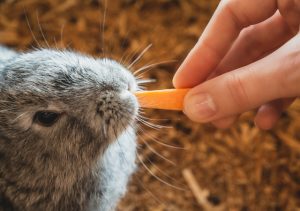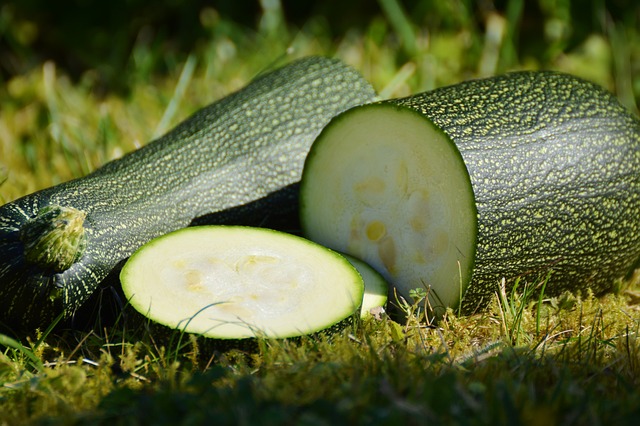
If allowed, your Rabbit will eat almost anything that you put in front of him or her. For the most part, the food choices would be safe for the rabbit. They do have some sense of what they can eat and what they cannot eat. However, there are many items that a rabbit can have, but only in small quantities once or twice a week.
If the food you offer your rabbit smells good to him or her, they will eat it. They have no regard or thought to what that food will do to them. Just as with humans, many foods can cause issues for the rabbit.
Some may cause serious digestive issues, some, if the rabbit enjoys it, will make the rabbit stop eating what it should be eating. An example of this is if the rabbit is full from treats such as fruits and other vegetables, it may not nibble and chew on the Timothy hay that should be the main portion of their diets.
Timothy hay helps the dental aspect of your rabbit. It is a sturdy enough hay that it helps to keep the growth of the teeth down in the rabbit. Their teeth, if overgrown, will stop them from eating the nutrition they need, because they will not be able to chew or bite it properly. This will lead to further dental problems and ultimately higher medical bills on behalf of the rabbit.
What is Zucchini?
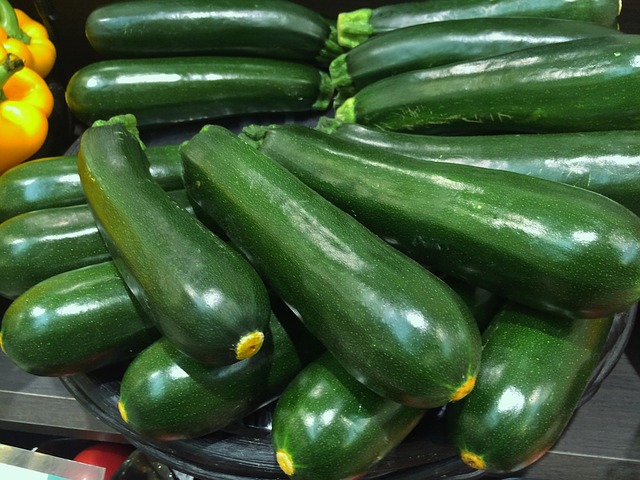
Zucchini is part of the courgette family. It is part of the squash family. For humans, Zucchini is a very versatile food. It is also nutritious. Zucchini contains high amounts of Vitamins A, C, K, and B. Zucchini is full of water which makes it a good hydration food. This helps keep the body and it’s systems working properly.
Zucchini is high in antioxidants. Antioxidants are what help your body fight free radicals and damage caused by those free radicals. Zucchini is high in fiber. This helps the body eliminate waste and toxins. This fiber also helps aid digestion and the absorption of food nutrients. Fiber also helps to stabilize your blood sugars. This helps prevent jumps in blood sugar and also drops in blood sugar.
Fiber also helps lower the risk of heart disease. Lowering the blood sugar levels also helps regulate the diabetes for those who suffer from diabetes. Zucchini is low in calories, carbohydrates, and has no fat. Zucchini Squash has a wide array of nutrients such as calcium, zinc and potassium among many others.
Rabbits Choices
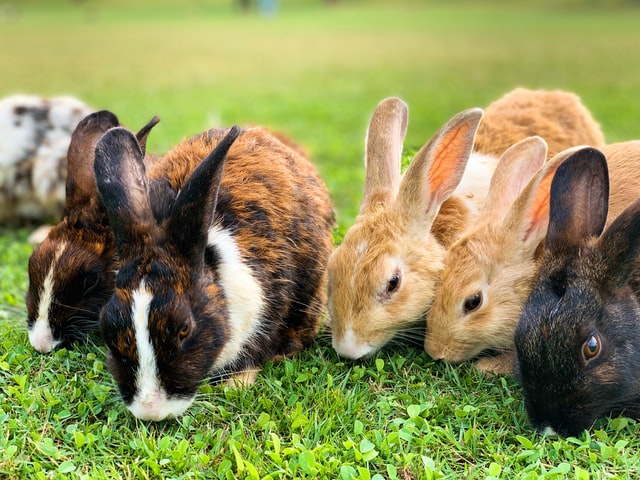
Will a rabbit eat zucchini? Definitely! A rabbit will eat what is offered to them. However, if you place a rabbit into an area that contains a variety of garden vegetables, such as carrots, peas, beans and beets, the rabbit will choose any of those other vegetables over the zucchini.
Zucchini is safe for a rabbit to eat, however, they should not have large amounts of the vegetable. Even though the rabbit may completely enjoy zucchini, they would still be much better off eating more of the recommended foods for their diet.
The proper foods and amounts include 80% of Timothy hay or another good quality hay. 20% vegetables, these should be green leafy vegetables such as kale and spinach. 10% fruits and 10% high nutrition pellets. Rabbits should also have access to clean and fresh water all day long.
Baby rabbits have a much more sensitive digestive system, it is for this reason that they should not have zucchini, even in small amounts. For the adult rabbit, there is no need for you to peel the skin off the zucchini or remove the seeds. The seeds are soft so they are easy to chew and digest for the adult rabbit. Your rabbit could also eat the flowers and the leaves from the zucchini plant. That is as long as they are fresh.
As a warning, do not cook the zucchini for your rabbit or feed them leftover zucchini that has been cooked. Rabbits need the raw plants to give them the nutrition that their bodies need. Simply put, a rabbit’s stomach is unable to handle cooked foods the way it does raw foods.
Concerns
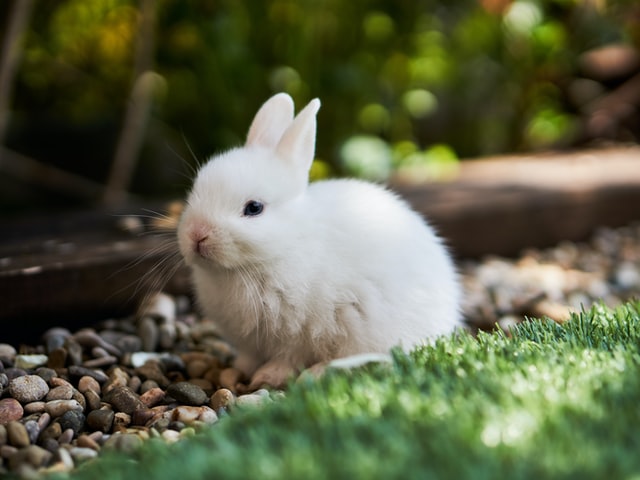
There are a few concerns that rabbit owners should be aware of when it comes to zucchini.
- Before giving your furry friend any zucchini, be sure to wash it completely. You need to get rid of all the pesticides or other chemicals, if any that are on it.
- Bugs and Parasites can be hiding in little grooves of the zucchini. This is another reason to wash and scrub the zucchini very well. This will remove the bugs and any parasites that are on the vegetable. Parasites can cause serious health issues for your rabbit's system.
- Your rabbit should never be served any vegetable or fruit that is overly ripened or rotten. Even if it is one tiny spot, please be smart and throw it out. These overly ripened fruits and vegetables can cause gastrointestinal issues and diarrhea in your rabbit.
- Baby bunnies: the very young bunnies have a very sensitive digestive system. They should not be fed any type of fruits or vegetables until they have reached at least 3 months old.
Once your rabbit turns 12 weeks old, you can begin with a very small amount of zucchini. Like all new items that you want to feed your rabbit, start low and slow. This should help prevent any serious health issues from happening. This slow method of giving new foods allows the owner to see if there are any adverse reactions or behaviors from eating the new food.
Servings
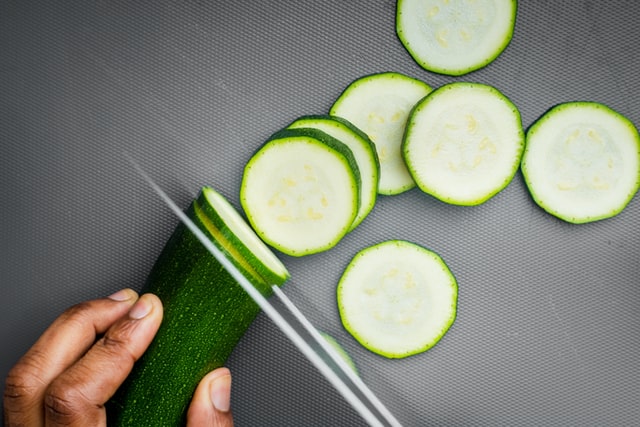
When you do decide to feed your rabbit zucchini squash, be sure to follow the recommended guidelines. Your rabbit should only receive zucchini one or two times a week. When you do give them zucchini, you should make it 1 or 2 slices that are ⅛” to ¼” in width.
Again, zucchini should be considered a treat and not as a daily food supplement. This would cause health issues in the digestive tract or other possible health concerns. Key to remember, just as with humans, Moderation is the key to better health.
Signs of Adverse Reactions
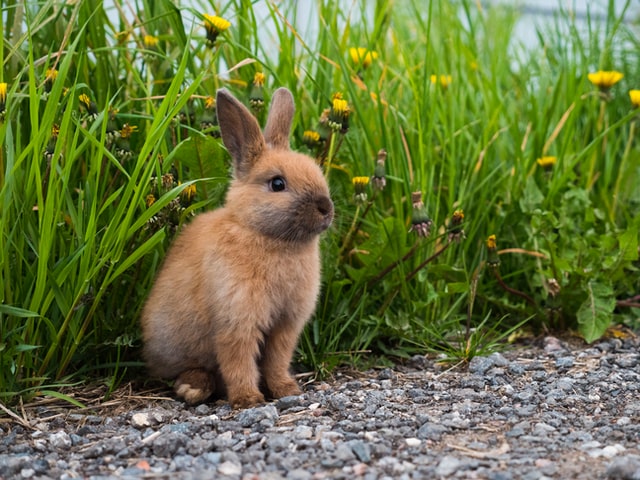
If the rabbit is unable to handle the zucchini, whether it is because it is over ripe or rotten, has chemicals or pesticides, or if the digestive system could not handle it, they will show some signs to watch for.
- Lethargy
- Refusal to eat anything
- Diarrhea or loose stools
- Excessive itching, scratching or licking of the skin or paws.
Zucchini should only be fed to rabbits as a small part of the high fiber diet that is a recommended diet. If you have questions or concerns, it is always wiser to contact your veterinarian and have a discussion with him or her.
For the amount of minerals and nutrients and vitamins found in zucchini, one would think that feeding a larger amount to a rabbit is a good idea. As it would give them more nutrients, and minerals. This is far from the truth.
Too much of zucchini can cause GI Stasis in your rabbit. This is a very serious condition that can lead to death. No more than 100-128 grams per two pounds of your rabbit's weight, is the recommended amount.
Another reminder, if you notice any change in behavior, feeding or health wise, such as stools are loose, the rabbit is lethargic or not eating at all, please make a call to your veterinarian and then take your rabbit in to the vet to be checked. Do not sit back thinking that the rabbit will work through this situation. Most often the veterinarian will be able to help or tell you what needs to be done for your rabbit.
One important thing to do immediately is to remove all food items except the Timothy hay or other good quality hay. Also keep the water fresh and full all day. By putting them back on a strict diet of just the hay and water, this should help push all the bad out of the digestive tract. So if this is what your veterinarian recommends, then follow the instructions exactly.
There are many other options that your rabbit is able to have that are just as nutritious or just about as nutritious as zucchini. Discuss with the breeder, the veterinarian or other professional that knows rabbits. They will give you a list of items that you can readily give your rabbit instead of zucchini.
Unlike the wild rabbits who have a whole forest or woods to choose from the fruits and vegetables, domesticated rabbits rely on the owner to provide them what they are allowed to eat. Do not harm your furry friend by giving them food that is dangerous for them.
If you are unsure, please do not give the item to your rabbit. Call the veterinary Clinic first, or even a rabbit breeder who could answer the questions for you. It is always better to be safe than to take a chance with your rabbit.


